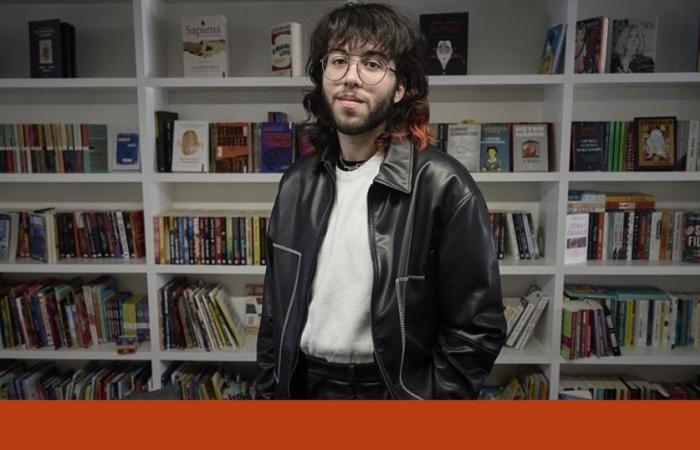
In a couple of years, Rodrigo Manhita went from a student in the event organization field to an editor in one of the largest publishing groups in the world — all before turning 20. In between, there is a “very atypical and strange” professional path that has nothing to do with books or the publishing world, “at least in the early days”. Having been editor for a year and running the publishing house dedicated exclusively to younger readers that he helped create, Rodrigo has very well-defined objectives for the future. He believes that publishers have “some social responsibility” in the books they publish, which is why he wants to encourage young people to read more Portuguese, Spanish and Brazilian authors and (continue to) bring more books by different authors and stories starring characters queer.
Let’s start with the beginning of Rodrigo’s “early” professional career, very inspired by his parents, both entrepreneurs, who from an early age gave him “a lot of freedom” to try to understand the “world of work”. At the age of 16, he created a company dedicated to Asian culture that brought together a store onlineone site entertainment sector with the production of its own content and an event organization aspect. He ended up falling in love with this last branch and decided to close the company and pursue a technical-professional course.
“I wanted to explore something else. I was very young, I had the advantage of being able to do it without having to think twice”, he recalls. In the final project, the class was challenged to organize a “serious” event, and after many written and rewritten plans, Rodrigo decided to combine the ancient love for books and the more recent fascination with Asian culture. “The Asian market is very good at working with the culture of fandom and the visual part, being able to have a very stable and especially young audience. I started thinking about how the two worlds could come together, because I really liked books, but I didn’t necessarily like what happened around books in Portugal.“
RUI GAUDÊNCIO
After several attempts, he managed to get Penguin Portugal to buy his idea and was responsible for the book launch event Shore Unraveled, by Portuguese author MG Ferrey. “It took almost six months to prepare this launch and the event, which brought together more than 300 people in Porto. I developed the entire graphic part, with a very structured marketing plan. I am a very open and very spontaneous person also because of my experience in organization of events”, guarantees the 19-year-old.
The event was such a success that he received an offer to do an internship at Penguin and, later, to permanently join the marketing and communications team at Penguin. part-time. “With all these experiences I ended up discovering a deeper love for marketing. I was going to go to university, to study marketing and advertising, and I agreed to stay and do everything related to the communication of our younger books”, says Rodrigo. But it wasn’t quite like that: he went to university, yes, but he didn’t like the experience and dropped out at the end of the first semester, remaining to work at the publishing house full time.
At the beginning of 2023, already aware of the impact (which is not that recent) of young people on the buying and selling of books, a publisher was looking for a new breath and to head a future seal — the Secret Society — dedicated to the genre. young adult at Penguin. Rodrigo, who had no experience in the area, ended up “embracing” yet another challenge.
“I had to understand what I brought to the table differently as an editor. My entire journey is very precocious and very young and I think that means we always have to prove why we are there and not someone else who studied for that and has several years of experience. I came to the conclusion that what I brought to the table was precisely this perspective of marketer much more incisive and strategic than the segment young adult demands”, he recalls. “At first it was strange, but exciting. I really like change and new things, but I had never thought about going into publishing. I accepted because I wanted to explore a new area and not necessarily because my dream was to be an editor, but I think I adapted very well and even faster than I thought.”
The day-to-day life of an editor
The fact of being a “social butterfly“ It helped to make adapting to a profession that “is changing a lot” smoother. From the beginning, he sought to make international contacts and managed to create a network of editors in the youth segment with whom he exchanges ideas every week. On a day-to-day basis, he plays several roles: there is Rodrigo who is editing text when the book he has in his hands is by a Portuguese author, Rodrigo who analyzes trends and does research on social media, to “understand what are people talking about and what do they want to read”, and Rodrigo is almost a reader.
“Part of my job is to filter the manuscript proposals I receive and ask the authors’ agents for books. Then I simply have to read them. Most editors like to read the texts in full, but in the segment young adult and with the amount of work I have this is almost impossible. I read between ten and 20% of the books.”
Then, you need to understand how to sell each book: what the cover will look like, the design, the price, the content for social networks and outline a strategy so that “everyone can work together”. “O young adult moves very quickly, follows trends a lot and you need to be able to follow the public and understand how to reach them”, says the young editor.
RUI GAUDÊNCIO
In such a demanding market, how do you decide which books to put out there? Rodrigo believes that “social responsibility” must be taken into account. “I think that as a large publishing group we have some social responsibility and that’s why I try not to look at books from a profit perspective. I know that I want to have books that make sense in the market and that don’t yet exist, that maybe won’t sell as well, but that are needed. Brazilian authors, for example. These are books that, as a rule, don’t tend to do well, but I think we need to do this work of bringing in cultures other than Anglo-Saxon ones.”
Another of the young editor’s “rules” is to have books queer, with different characters and different authors, and more Spanish and Portuguese “voices”, which are “very much missed” in this segment. “There is work to understand what is missing in the catalogue. There is such a huge avalanche of books in the United States and the United Kingdom and many things are similar or reach the same audience. I can use this space to fill it with something different”, he says .
Explaining the challenges of the publishing world to those who buy and read books “is not always an easy job”, but Rodrigo tries to demystify some concepts in this area on his Instagram, with posts that explain what a relaunch or auction of a book is, for example example. “A publisher is still a business in which it is necessary to deliver financial results so that the rest can happen. I think people don’t realize how precarious the publishing market is at a financial level. The sales figures at the end of the year, released by Portuguese Association of Publishers and Booksellers at the end of each year, they are incredible. The problem is the number of titles that have to be launched to reach that number of units.”
And instead of “trying to counter” pressure from the North American and British markets, the objective will be to “try to keep up”: publishing works on the same dates as the UK and US markets and launching series and trilogies without months or years of waiting between books, for example.
“I think we have to understand what our product has to offer in relation to publishing in other countries. Books in English will always be cheaper because the publishing market is very different, we won’t be able to compete with that. We have to add something more”, he explains. “That’s why we wanted to have the double spine, the special bookmark, the graphic elements and even the trigger warnings in all our books and I think we benefited from this difference. It’s no longer just a question of price. The reader can buy the English edition because it’s cheaper, but you know you’ll be missing out on all these details.”
In the future, Rodrigo wants to continue the work of bringing the publishing market closer to younger readers and create a community that begins but does not end with books — which expands to events, avatars, web series and augmented reality technology in works published under this new umbrella. “In recent years we have witnessed a natural process where books have become closer to young people because there has also been a democratization in communication. Before everything was the responsibility of publishers and communication was very institutionalized and serious. Suddenly we have social networks that allow people share very spontaneously. Young people started to look at the book in a different way, and thank goodness.”
Tags: Rodrigo put diversity national authors young peoples bookshelves Interview
--




